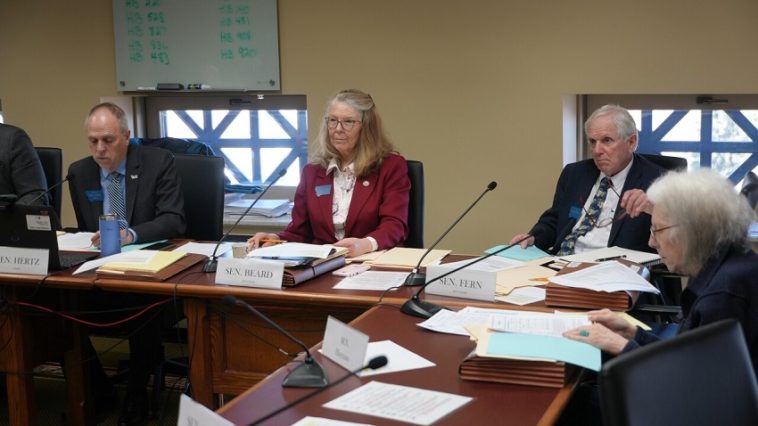Missoula, MT – As the 2025 Montana legislative session enters its final three weeks, lawmakers are intensifying efforts to address the growing concerns over property tax rates. A series of bills aimed at providing relief for residential, commercial, and agricultural property owners are currently under scrutiny, and the next steps will largely hinge on decisions made by the Senate Taxation Committee.
On Monday, the committee held hearings on several key pieces of proposed tax legislation, including House Bill 528, a sweeping proposal introduced by Rep. Ed Byrne, R-Creston. The bill seeks to significantly lower tax rates across the board, aiming to offset the steep increases that have hit property owners since 2021. Supporters of the bill argue that the changes are necessary to alleviate the financial burden on property owners, especially in light of recent spikes in property tax assessments.
Byrne, who is sponsoring the legislation, presented his proposal as a broadly popular measure designed to provide meaningful tax relief. However, the bill has sparked opposition from several sectors, particularly utilities and energy companies. These groups argue that the proposed tax reductions could shift the tax burden to essential infrastructure, including electrical generation facilities, telecommunication facilities, and pipelines.
Despite the pushback, Byrne remained optimistic about the bill’s prospects, suggesting that the state could offset any potential revenue losses by tapping into other funding sources. He also emphasized the importance of ensuring that any tax relief provided doesn’t result in disproportionate burdens on other sectors. “Once I leave here, the bill is yours; you can amend it any way you want,” Byrne told committee members. He also warned that without significant progress on tax relief, voters could push for a proposed ballot initiative aimed at capping the growth of residential property values, which could have even more far-reaching consequences for the state’s tax system.
In addition to House Bill 528, the Taxation Committee heard testimony on House Bill 483, introduced by Rep. Courtenay Sprunger, R-Kalispell. This bill addresses Montana’s “95 mills” – the portion of property taxes allocated to ensure equity across school districts. Under the proposal, any excess revenue generated by these mills would be used to reduce local property taxes. Sprunger emphasized that her bill is flexible and can be adapted to fit within the broader context of the legislature’s ongoing tax discussions.
“We’re looking at many different property tax solutions,” Sprunger acknowledged during the hearing. “So the reality is this bill has to be able to be responsive to whatever final proposals emerge.”
Another important piece of legislation under consideration is House Bill 231, introduced by Rep. Llew Jones, R-Conrad, which aligns with Governor Greg Gianforte’s preferred tax reform proposal. This bill seeks to offer lower tax rates for primary residences, long-term rentals, and smaller commercial properties while raising rates on properties that don’t qualify for these breaks. Jones’ proposal has garnered support from the governor, who has made it a cornerstone of his tax relief agenda.
The committee also heard testimony on House Bill 220, introduced by Rep. Mary Caferro, D-Helena, which would establish a tax credit for parents of young children. The bill proposes up to $1,200 in tax relief for each child under the age of five, a move that supporters argue would ease the financial burdens faced by families. Additionally, House Bill 827, sponsored by Rep. Melody Cunningham, D-Missoula, would increase exemptions for Social Security payments, providing further relief to senior citizens.
Despite the variety of proposals on the table, the price tags attached to these bills have raised concerns about the state’s fiscal capacity to implement them. With Montana facing a complex budget situation, lawmakers will need to carefully weigh which measures they can afford.
Bob Story, executive director of the Montana Taxpayers Association, expressed frustration that many of the key decisions were being deferred to the Finance and Claims Committee. “You are the tax policy committee,” Story remarked during the hearing. “I hate to see when the policy committee sends all the decisions down to Finance and Claims to be made.”
Sen. Greg Hertz, R-Polson, who chairs the Taxation Committee, indicated that the committee could begin voting on some of the key tax bills as early as Tuesday, assuming amendments are finalized in time. As lawmakers continue to debate the future of property tax reform in Montana, the next few weeks will likely be crucial in determining the direction of the state’s tax policy.
With multiple proposals vying for attention, the legislature faces the challenge of crafting a tax relief plan that balances the needs of property owners with the state’s fiscal realities. The outcome of these deliberations could have lasting implications for Montana taxpayers for years to come.



